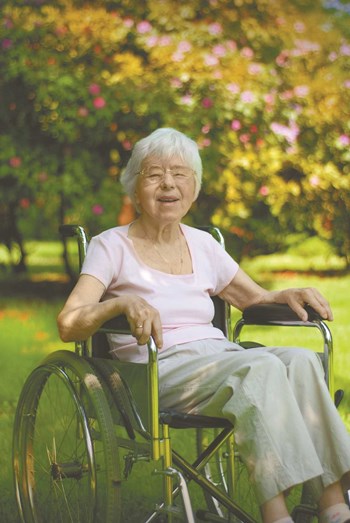
Meet the residents of the fictional Manor Woods condominium. Mrs. Jones loves her unit. She’s been living there for 30 years and while she’s still independent, she walks and talks a little slower than she used to. Next door, David was in a motorcycle accident a few months ago and is still recuperating from his two broken legs. A few floors down 12-year-old Brenda stays at home alone for a few hours every day while her parents finish working.
On a typical day, everyone just goes about their business, but what if a typical day suddenly turned not-so-typical? Perhaps a fire starts, the power goes out or there’s a gas leak. Some elderly, disabled and special needs residents can fend for themselves in an emergency, but others can’t. Your responsibility is not to be a caretaker but to know which residents need help.
Most of the residents will be OK but Mrs. Jones, who might get out of her house, also has the start of dementia and becomes confused at all the ruckus. David can’t walk right now and Brenda is too scared to open the door to anybody. Who looks out for these folks?
An emergency situation can happen at any time, anywhere and how you respond to it and how fast, can be the difference between life and death. All residents will need to get out of the building, if necessary, as fast as possible, but it’s important to know which ones may need a little extra assistance.
Keith Hales, president of Hales Property Management in Chicago, says that he wouldn’t think of asking a resident if they needed special assistance. Instead, he makes sure the residents know that if they do need extra assistance, they should let the managers know.
“In one building we have a disabled person who lives on the top floor, but we’ve already planned for this person,” he says. “The resident had money from the federal government that paid for retrofitting doors to become motorized, etc., so his accommodations are for his benefit. If you need us other than that, call us. We’re not sure we need to be proactive about finding out who needs help and who doesn’t, but on the other hand, you don’t want to step on someone’s privacy either. In a condo, the philosophy is that you need to stand up for yourself.”
Don’t Ask... Don’t Tell
And Hales has good cause to not pry, even if it’s to help the resident. Under the Fair Housing Act, it is usually unlawful for all housing providers to ask if an applicant has a disability or if a person intending to reside in a dwelling or anyone associated with an applicant or resident has a disability, or ask about the nature or severity of such persons' disabilities.
For example, say you offer accessible units to persons with disabilities; you can ask if they have a disability because you want to see if they can use the features of the unit. However, you may not ask if they have other types of physical or mental impairments.
However, if Hales found out about an at-risk situation—say a latchkey kid—that wasn’t told to him by the residents, he says that they then find out what to do with the information. “We’re not going to knock on doors and ask questions, but if something is brought to our attention, we’ll address it by contacting our legal team and the board to come up with a clear plan or protocol,” he says.
Even with a clear plan or protocol in place, each resident may need to be treated differently during an actual crisis. Larry Gard, Ph.D., lives in a high-rise building on Chicago's Gold Coast and has watched residents ‘age in place.’ He says the staff tries to be supportive of older residents—for example, going out of their way to assist with packages—but believes more training is needed to understand how to deal with older residents whose mental or physical conditions have deteriorated.
“If staff must help evacuate a cognitively-impaired older adult, they need to know how to avoid making the individual even more agitated,” says Gard, a clinical psychologist with specialized training in geriatric psychology from Northwestern University Medical School. “For example, if you’re trying to alert a confused older resident that there was a fire in the building, pounding on their front door and yelling might not be the best approach.”
Gard says that if time permits, a calmer intervention such as a phone call asking them to come to their front door might be preferable.
“Similarly, since a resident might not be used to staff coming to their unit unannounced, it might be better to enlist a neighbor to knock on their door,” he explains. “Instructions should be given one step at a time. Cognitively-impaired individuals may have difficulty following a sequence of instructions given all at once. If possible, try to make sure that the area is well lit and that surrounding noise is minimized.”
Gard also suggests that managers have up-to-date contact information for residents, especially someone that the property manager can contact in case of any special needs.
Create a Policy
Signe Gleeson, president of ElderCare Solutions in Naperville, says that an emergency policy should be created to address any situation that might come up. “What happens if, all of a sudden, you don’t see Mrs. Jones?” asks Gleeson. “Do you have a policy for that? There’s a fine line with people who are concerned and those who are nosy. Sometimes the property manager is the first person to alert family members to a difficulty.”
The Senior Home Safety Network is another organization that can help address any potential issues before a crisis occurs. The SHSN is a national network of inspectors dedicated to helping seniors and adult children who are too busy or too far away to keep parents home safe.
“Our goal is to help them live safely at home for as long as possible,” says Dan Howard, the president of Senior Home Safety Network in Freeport, Pennsylvania. “People still own the property in a multifamily building and the property manager reacts to things that people notice,” he says. “For example, the ceiling fell; there was a leak, etc. They are not attuned to look around and prevent those issues from happening.”
As for teenager Brenda, for example, she was properly instructed by her parents to not open the door to strangers but that may make your job a little harder in an emergency. Unfortunately, Brenda’s parents also feel uncomfortable telling you that their child is home alone. If someone shares this information with you, you could try to convince them that, in an emergency it could save their child’s life. The parents may provide you with emergency phone numbers and any language-barrier information. However, if there’s a building or property emergency, she might not let you in or evacuate with you. A good property manager needs to work with the parents to create a system of communication with their children.
And, if Brenda still doesn’t open the door during an emergency, have a uniformed firefighter or police officer accompany you to the door to explain the emergency.
If reaching out to residents to let them know you can help should an emergency arise hasn’t worked, the resident can always contact the city of Chicago, which has created a voluntary registry for individuals who may need assistance in the event of an emergency. In accordance with Illinois Public Act 096-0788, Section 35, registry participants are advised that the provision of special needs information will not result in preferential treatment. If you visit The Voluntary Emergency Assistance Registry for People with Disabilities or Special Needs, an application can be obtained via the link: cityofchicago.org/voluntaryregistry. Individuals with disabilities or special needs (or their caregivers) can sign up by either going to the website or by contacting the Mayor’s Office for People with Disabilities (MOPD) at 312-744-7050 (voice) or 312-744-4964 (TTY) for additional information.
Although every person is ultimately responsible for his or her own safety in the event of an evacuation, management and staff should still be the guiding force to make certain an evacuation goes smoothly. In any emergency situation, residents and occupants will look to you and your staff for leadership. They’ll want to know what’s wrong, what to do, where to go and how to get there.
Lisa Iannucci is a freelance writer and a frequent contributor to The Chicagoland Cooperator.






Leave a Comment